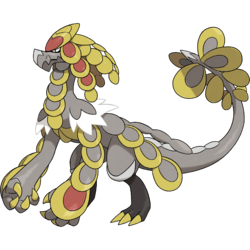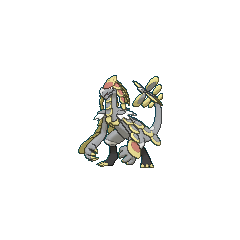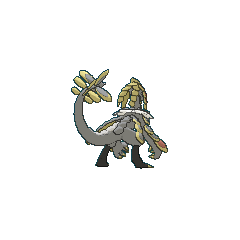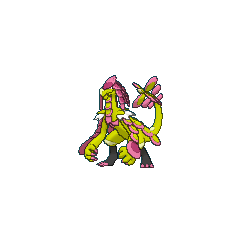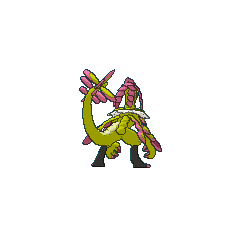From Bulbapedia, the community-driven Pokémon encyclopedia.
|
|
| Line 48: |
Line 48: |
|
| |
|
| ==In the anime== | | ==In the anime== |
| | [[File:Totem Kommo-o.png|thumb|left|250px|Totem Kommo-o in the {{pkmn|anime}}]] |
| ===Major appearances=== | | ===Major appearances=== |
| [[File:Totem Kommo-o.png|thumb|left|250px|Totem Kommo-o in the {{pkmn|anime}}]]
| |
| {{DL|Totem Pokémon|Totem Kommo-o|Kommo-o}} debuted in [[SM051]], where it was a [[Totem Pokémon]]. | | {{DL|Totem Pokémon|Totem Kommo-o|Kommo-o}} debuted in [[SM051]], where it was a [[Totem Pokémon]]. |
|
| |
|
| ===Minor appearances=== | | ===Minor appearances=== |
| | |
| | {{clear}} |
| <!-- | | <!-- |
| ==In the manga==--> | | ==In the manga==--> |
Revision as of 04:33, 23 February 2018
Kommo-o (Japanese: ジャラランガ Jyararanga) is a dual-type Dragon/Fighting pseudo-legendary Pokémon introduced in Generation VII.
It evolves from Hakamo-o starting at level 45. It is the final form of Jangmo-o.
Biology
Kommo-o is a bipedal, reptilian Pokémon covered in scaly armor. Most of its body is gray with some lighter gray areas as well as yellow and red markings. It has a rounded, beak-ish snout and small eyes nearly hidden under its head armor. On the tip of its snout is a patch of pale gray, and both the upper and lower jaws have a small, tooth-like spike on each side. The top of its head is covered by an elaborate arrangement of scales. At the front of the headdress is an oval scale, which is yellow with a red heart-shape at the base. On either side of the front scale is a chain of four circular scales; the first three scales are red with yellow trim and the last scale is solid yellow. Three additional chains of plain yellow scales extend from the back of the headdress. Running down the front of its long neck is a line of overlapping scales: one solid gray at the top, three larger gray ones with yellow rims, and one solid yellow scale at the bottom. A thick yellow stripe with a rounded projection in the center runs across its chest. Covering its shoulders are tufts of spiky, white feathers with small, gray scales overlapping them. Four overlapping scales cover the tops of its arms: three are gray with yellow edges, and the scales that cover its hands are red with yellow edges.
Kommo-o has four chains of scales, all of which consist of four scales, extending from just behind its shoulders. The two foremost chains are made of overlapping scales, and have a solid gray scale at the top followed by three scales with yellow edges. The other two chains are made up of only solid gray scales and do not appear to overlap. The lower half of its legs is dark gray, and there is a pale gray marking across each knee. Its hands have four yellow claws, while the feet have only three. A long line of slightly raised, pale gray scales runs down the center of its back to about halfway up its tapering tail. Near the tip of its tail are three sets of loose scales that increase in size near the tip. Each set is made up of four separate scales that encircle the tail; the two lower sets are solid yellow, while the set nearest the tip have gray centers. The very tip of its tail is pale gray.
Kommo-o, having completed its harsh training, returns to its birthplace to protect Jangmo-o. However, it only watches over them from a distance. Because it does not wish to fight weak foes, it clangs its scales together when it senses someone approaching. This ringing sound alerts others of its presence. The power of this Pokémon’s uppercut is enough to send foes flying. Simply raising its arms can generate enough force to change its surroundings. According to legend, Kommo-o's glittering scales are meant to drive away a great darkness. The reason it seeks strong opponents is also said to be a quest for power to defeat the darkness. [1]
Kommo-o is the only known Pokémon capable of learning the move Clanging Scales and it has the exclusive Z-Move Clangorous Soulblaze.
In the anime
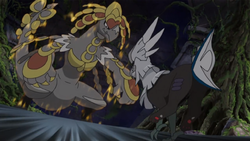
Totem Kommo-o in the
animeMajor appearances
Kommo-o debuted in SM051, where it was a Totem Pokémon.
Minor appearances
In the TCG
- Main article: Kommo-o (TCG)
Game data
Pokédex entries
| This Pokémon was unavailable prior to Generation VII.
|
| Generation VII
|
|
| Sun
|
When it spots enemies, it threatens them by jingling the scales on its tail. Weak opponents will crack and flee in panic.
|
| Moon
|
Its rigid scales function as offense and defense. In the past, its scales were processed and used to make weapons and other commodities.
|
| Ultra Sun
|
When it howls after finishing off its prey, the metallic sounds of its celebrating comrades can be heard from all around.
|
| Ultra Moon
|
It battles valiantly with its fists, which are armored in steel scales. Kommo-o specializes in uppercuts.
|
|
|
Game locations
| This Pokémon was unavailable prior to Generation VII.
|
|
|
In side games
Held items
Stats
Base stats
| Stat
|
Range
|
| At Lv. 50
|
At Lv. 100
|
75
|
|
135 - 182
|
260 - 354
|
110
|
|
103 - 178
|
202 - 350
|
125
|
|
117 - 194
|
229 - 383
|
100
|
|
94 - 167
|
184 - 328
|
105
|
|
99 - 172
|
193 - 339
|
85
|
|
81 - 150
|
157 - 295
|
Total: 600
|
Other Pokémon with this total
|
- Minimum stats are calculated with 0 EVs, IVs of 0, and (if applicable) a hindering nature.
- Maximum stats are calculated with 252 EVs, IVs of 31, and (if applicable) a helpful nature.
|
Type effectiveness
| Under normal battle conditions in Generation IX, this Pokémon is:
|
|
|
|
|
|
|
|
|
|
|
|
|
Learnset
|
|
|
|
- Bold indicates a move that gets STAB when used by Kommo-o
- Italic indicates a move that gets STAB only when used by an Evolution of Kommo-o
|
|
|
|
|
- Bold indicates a move that gets STAB when used by Kommo-o
- Italic indicates a move that gets STAB only when used by an Evolution of Kommo-o
|
|
|
|
|
- Moves marked with an asterisk (*) must be chain bred onto Kommo-o in Generation VII
- Moves marked with a double dagger (‡) can only be bred from a Pokémon who learned the move in an earlier generation.
- Moves marked with a superscript game abbreviation can only be bred onto Kommo-o in that game.
- Bold indicates a move that gets STAB when used by Kommo-o
- Italic indicates a move that gets STAB only when used by an Evolution of Kommo-o
|
|
|
|
|
- A black or white abbreviation in a colored box indicates that Kommo-o can be tutored the move in that game
- A colored abbreviation in a white box indicates that Kommo-o cannot be tutored the move in that game
- Bold indicates a move that gets STAB when used by Kommo-o
- Italic indicates a move that gets STAB only when used by an Evolution of Kommo-o
|
|
|
|
|
- Bold indicates a move that gets STAB when used by Kommo-o
- Italic indicates a move that gets STAB only when used by an Evolution of Kommo-o
|
Side game data
Evolution
Sprites
| This Pokémon was unavailable prior to Generation VII.
|
|
|
Trivia
Origin
Kommo-o appears to be based on a theropod dinosaur with some traits from ankylosaurs. It may also be based on a monk. Kommo-o's tail bears resemblance to a khakkhara (monk staff), and is used in a similar fashion.
Name origin
Kommo-o may be a combination of commotion (in reference to the noises produced by its scales) and mo'o (Hawaiian for lizard or dragon). It may also incorporate combat, commander, and komodo as in the Komodo dragon.
Jyararanga may derive from ジャラジャラ jarajara (onomatopoetic sound for jingling), dragon, and ガランガラン garangaran (onomatopoetic sound for clanging).
In other languages
| Language
|
Title
|
Meaning
|
 Japanese Japanese
|
ジャラランガ Jyararanga
|
From ジャラジャラ jarajara, dragon and ガランガラン garangaran
|
 French French
|
Ékaïser
|
From écaille and kaiser
|
 Spanish Spanish
|
Kommo-o
|
Same as English name
|
 German German
|
Grandiras
|
From grand, Drache, and rasseln
|
 Italian Italian
|
Kommo-o
|
Same as English name
|
 Korean Korean
|
짜랑고우거 Jjaranggougeo
|
From 짜랑 jjarang, dragon, 거대 (巨大) geodae and possibly from English word "ogre".
|
 Mandarin Chinese Mandarin Chinese
|
杖尾鱗甲龍 / 杖尾鳞甲龙 Zhàngwěilínjiǎlóng
|
From 杖 zhàng, 尾巴 wěibā, 鱗甲 / 鳞甲 línjiǎ, and 龍 / 龙 lóng
|
 Cantonese Chinese Cantonese Chinese
|
杖尾鱗甲龍 Jeuhngméihlèuhngaaplùhng
|
From 杖 jeuhng, 尾巴 méihbā, 鱗甲 lèuhngaap, and 龍 lùhng
|
|
|
|
| More languages
|
 Russian Russian
|
Коммо-o Kommo-o
|
Transcription of English name
|
|
|
|
Related articles
Notes
External links

|
This Pokémon article is part of Project Pokédex, a Bulbapedia project that aims to write comprehensive articles on each Pokémon species, as well as Pokémon groups and forms.
|

 For other sprites and images, please see Kommo-o images on the Bulbagarden Archives.
For other sprites and images, please see Kommo-o images on the Bulbagarden Archives.
